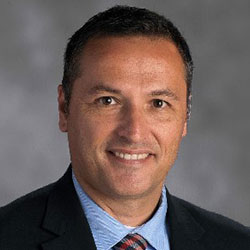
Career
Current position: Superintendent, RSU 57, Waterboro, Maine
Stephen has been an educator for nearly twenty-five years, beginning as a special education teacher. Through coursework and professional experience he has earned seven Maine educator certifications.
Degrees:
- PhD in Public Policy with a concentration in Educational Leadership and Policy, University of Southern Maine, 2015
- MS in Educational Leadership, University of Southern Maine, 2000
- BS in Education and Secondary Social Studies, University of Maine, 1992
Memberships and associations:
- Maine ASCD Board of Directors
- York County Superintendents Association
- York County Administrative Certification Collaborative
- Maine Principals Association
Awards:
- Terrel H. Bell award for Outstanding Leadership, 2016
Dissertation
Title: Investigating the Influence of Professional Development on Teacher Perceptions of I Engineering Self-Efficacy
Dissertation Abstract: This mixed-methods study examines the influence of a professional-development intervention to support educators in the integration of engineering education at the elementary level. Particular consideration focused on the evolution of teachers’ perceptions of engineering self-efficacy following engagement in professional development intended to support the introduction of engineering in selected grade-five classrooms. The significance of this study rests in the reality that as interest in K-12 engineering grows, reform efforts necessary to support the professional development and instructional needs of educators too must grow. Through enhanced teacher professional development, and increased levels of self-efficacy, the ultimate goal of strengthening the United States’ position as a global leader of innovation and design may be achieved. A review of relevant literature on engineering goals, teacher knowledge, teacher knowledge of engineering, and professional development, was completed to gain a better understanding of the issues educators face as they plan to include engineering in elementary schools. From that review, two research questions for further examination were developed. (1) How do teacher perceptions of engineering self-efficacy evolve during implementation of an instructional unit in engineering? (2) What is the relationship between a professional development intervention in engineering and teachers’ perceptions of their content knowledge and pedagogical-content knowledge in engineering? Qualitative and quantitative data-collection strategies were conducted concurrently. Data were collected by three means: (1) three in-depth interviews with each participant; (2) pre- and post-intervention focus-group interviews with participants; and (3) an engineering self-efficacy scale completed at both the outset and conclusion of the study by research participants. The Teaching Engineering Self-Efficacy Scale (TESS) for K-12 Teachers survey instrument was selected for this study as it provided a means by which to measure change in engineering self-efficacy.
The results of the study reveal that all three study participants reported gains in all six sections on the TESS instrument. Pre- and post-TESS survey results reflect teacher perceptions of measureable improvement in their engineering pedagogical-content knowledge following a professional development experience, and subsequent presentation of an instructional unit in engineering. Those gains were consistent with findings from interviews with study participants that reflect perceived gains in confidence in the ability to teach engineering concepts in their grade-five classrooms.
This study suggests that elementary teachers with minimal, if any, formal academic preparation in engineering curriculum, assessment, and instruction can indeed integrate engineering integrate engineering concepts into their teaching. Through interactions with students, colleagues, and professional development interventionists, teachers developed increased levels of teaching engineering self-efficacy. This study suggests that professional development experiences that require participants to experience and present hands-on and student centered engineering tasks, learn engineering concepts as they teach them. One contribution of this study to the literature is underlining the fact that the ultimate goal of teacher-education professional-development experiences should not be simply preparing highly efficacious teachers, but more importantly preparing highly efficacious teachers who have solid engineering content knowledge.

